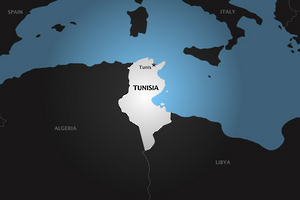Tunisia: Drop Charges Against Cameraman
Filming Egg Throwing Not a Crime
Tunisian authorities should immediately release cameraman Mourad Mehrezi,whose arrest for filming someone throwing an egg at the minister of culture is a blow to media freedom. The only evidence against Mehrezi, accused of participating in the assault, is an alleged confession he says he did not sign. The director of his television station has said he was present filming for his station. A camera operator should not be prosecuted simply for filming an assault.

Police arrested Mehrezi, who works for Astrolabe TV, on August 18, 2013, two days after he caught on camera the film director Nasreddine Shili hitting Culture Minister Mehdi Mabrouk in the face with an egg. On August 23 the public prosecutor brought charges against Mehrezi that include conspiracy to assault a public servant and harming public morals. Mehrezi’s trial will start on September 5, and if convicted of all charges, he faces up to seven years in prison.
“The lack of evidence of conspiracy means that Mehrezi is effectively detained for doing his job, which is filming events,” said Joe Stork, actingMiddle East and North Africa director at Human Rights Watch.“His prosecution is a bad precedent for media freedom in Tunisia.”
Mehrezi was filming an event at the Ibn Khaldoun Cultural Center in Tunis on August 16 to mark the 40th anniversary of the death of Tunisian artist Azzouz Chennaoui. Shili disrupted the proceedings by throwing an egg and hitting the minister. Judicial police arrested Mehrezi two days after Astrolabe TV released footage of the incident. The police told him when they arrested him that they suspected him of complicity in the assault on the minister, which Mehrezi denies.
Police arrested Shili four days after the incident and he is now in custody awaiting a decision of the prosecutor.
Mehrezi and Shili face charges of conspiracy to assault a public servant; harming public order and public morals; defamation of a public servant; drunkenness; disturbing the peace, tranquility, and well-being of citizens; and disrupting lives through public communication networks, under article 86 of the 2001 telecommunications law.
Ahmed Amine Ben Saad, director of Astrolabe TV, told Human Rights Watch that he asked Mehrezi to film the ceremony and showed Human Rights Watch his written mission order.
Human Rights Watch reviewed the entire video of the incident as filmed by Mehrezi. It shows the minister giving an interview to a journalist when Shili approaches him and crushes an egg on his left temple and forehead.
The public prosecutor’s office said in a statement on August 23 that Mehrezi and Shili confessed they had prepared the assault together and that Mehrezi knew of it in advance. Ayoub Gdhemsi, one of the lawyers on Mehrezi’s and Shili’s defense team, told Human Rights Watch that during a prison visit on August 28 Mehrezi told him he refused to sign the police statement because it contained false accusations about his complicity in the assault.
Mehrezi’s continuing detention appears to violate Tunisian law as well as international human rights law. Article 13 of Decree Law 115-2011, which regulates press freedom in Tunisia, states that “a journalist cannot be held liable for an opinion, idea, or information that he published in accordance with the customs and ethics of the profession and cannot be held responsible because of the performance of his duties unless it is established he has violated the provisions of this decree.” Article 19 of the International Covenant on Civil and Political Rights, a treaty to which Tunisia is party, guarantees the right “to seek, receive, and impart information and ideas of all kinds, regardless of frontiers, either orally, in writing, or in print, in the form of art, or through any other media,” while allowing for restriction of that right only when provided by law and necessary to protect national security, public order, public health or morals, or “for respect of the rights or reputations of others.”
“If the Tunisian authorities don’t release Mehrezi quickly and drop the charges against him, they will confirm that space is shrinking for media freedom,” Stork said.
Source: Human Rights Watch
- 423 reads
Human Rights
Ringing FOWPAL’s Peace Bell for the World:Nobel Peace Prize Laureates’ Visions and Actions

Protecting the World’s Cultural Diversity for a Sustainable Future

The Peace Bell Resonates at the 27th Eurasian Economic Summit

Declaration of World Day of the Power of Hope Endorsed by People in 158 Nations

Puppet Show I International Friendship Day 2020

